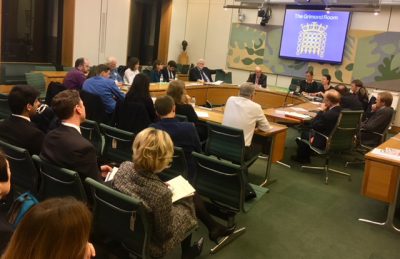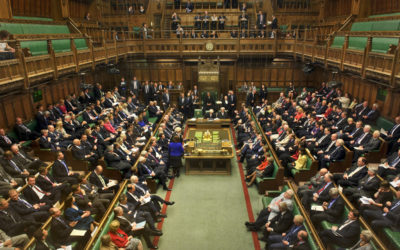‘Selling the Myth’
ForcesWatch comment

Our campaign to raise the age of military recruitment to 18 was discussed in the Westminster Parliament recently (17 January 2018) before representatives of all the mainstream parties.
The gathering was held under the banner Catch 16: Risks & consequences of enlisting minors into the British Armed Forces.
It was hosted by Liz Saville Roberts MP, who’s party – Plaid Cymru – are supportive of ‘Straight 18’ along with the SNP and the Greens.
Liz Saville Roberts made it clear she was “not against the army per se” but said she was concerned that “we are being sold a myth that the army is the right solution for young people”.
As someone from an educational rather than a military background she also sounded a grave warning – of “a tragedy” linked to age that was likely to occur if the law remained as it is today on the recruitment age.
She was joined by Rachel Taylor, the Director of Programmes at Child Soldiers International, who told the gathering that “the MoD uses 16 and 17 year olds to mitigate shortfalls in infantry”. Nearly one quarter (23%) of army recruits are under 18, yet other countries do not need to rely on this age group. Even in countries like the U.S., which still recruit at 17, a far smaller number of recruits comes from this age group.
Rachel detailed how research now shows that young recruits fair least well (higher drop out rates, less likely to be promoted, higher unemployment rates and generally poorer outcomes, higher mental health and injury rates) and debunks the myth that army enlistment is a sure way of improving a young person’s prospects.
In front of the MPs, Lords, Parliamentary staff, journalists and campaigners the army recruit turned filmmaker, Wayne Sharrocks, gave a compelling and emotional account of his experience of joining the British Army as a minor.
In 2006, aged 17, he joined the British infantry without even asking the basic questions about terms and conditions. He described the continual conditioning and punishment that training involves, particularly in order to be able to kill “at the flick of a switch”.
At 18, he was deployed to Afghanistan. While on tour he had numerous traumatic experiences including suffering major facial injuries, and witnessing the death and maiming of friends at close hand.
Life-long mental health problems
After being discharged in 2013, Wayne suffered serious depression resulting in a breakdown. It was only after leaving that he started to question what he had been through. He said that, with the mind still forming at the young age at which he enlisted, the conditioning would leave permanent effects.
He now supporting other veterans and campaigns for the British Army to raise its minimum enlistment age to protect the most vulnerable recruits from serious and avoidable harm.
There was also a screening of short – and shocking – clips from YouTube showing life at Army Foundation College Harrogate, where most army recruits aged under 18 are trained. The clips showed young soldiers posing with weapons, ‘milling’ (where recruits are put in a boxing situation but are not allowed to block or avoid punches) and what appeared to be extreme verbal abuse directed at recruits during training.
The meeting also heard from retired Royal Navy Captain, Paul Branscombe, who was for many years the head of the armed forces welfare charity SSAFA
He made clear his reservations about recruiting at 16, asking the question: “why is it that we still allow the British Army to recruit young men and women so young – knowing that they are so young?
“Many of these people are recruited in places where there is not a lot of work – that means not a lot of education or family support….”
He spoke of the irresponsibility of imprinting the conditioning necessary for training on recruits who are developmentally immature. For some, the resulting mental health problems remain for life.
While a good debate suggested that there was not complete uniformity of opinion in the room, many parliamentarians in attendance were supportive of raising the age of recruitment to 18.
You can read more on this in a recent article by Liz Saville Roberts and Rachel Taylor for Nation Cymru
See more: legislation & policy, recruitment age,
Like what you read?
> Sign up for our newsletter or blog notifications
> Support our work – from just £2 a month










